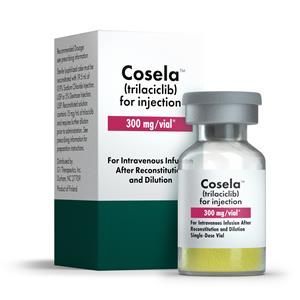Keytruda (pembrolizumab) vs Cosela (trilaciclib)
Keytruda (pembrolizumab) vs Cosela (trilaciclib)
Keytruda (pembrolizumab) is an immune checkpoint inhibitor used primarily to treat various types of cancer by enhancing the body's immune response against cancer cells. Cosela (trilaciclib), on the other hand, is a cyclin-dependent kinase inhibitor designed to protect bone marrow cells from damage caused by chemotherapy, and is not a treatment for the cancer itself. When deciding between these medications, it is essential to consider the type of cancer being treated and the goal of therapy, as Keytruda is used to directly target the cancer, while Cosela is used to mitigate the side effects of chemotherapy.
Difference between Keytruda and Cosela
| Metric | Keytruda (pembrolizumab) | Cosela (trilaciclib) |
|---|---|---|
| Generic name | Pembrolizumab | Trilaciclib |
| Indications | Various types of cancers including melanoma, lung cancer, head and neck cancer, Hodgkin lymphoma, and others | Used to decrease the incidence of chemotherapy-induced myelosuppression in adult patients when treated with certain types of chemotherapy for extensive-stage small cell lung cancer (ES-SCLC) |
| Mechanism of action | Programmed death receptor-1 (PD-1) blocking antibody, which helps the immune system to attack cancer cells | Cyclin-dependent kinase inhibitor that helps protect bone marrow cells from damage caused by chemotherapy |
| Brand names | Keytruda | Cosela |
| Administrative route | Injection (IV) | Injection (IV) |
| Side effects | Fatigue, musculoskeletal pain, decreased appetite, pruritus, diarrhea, nausea, rash, pyrexia, cough, dyspnea, constipation, pain in extremity, and headache | Fatigue, hypocalcemia, hypokalemia, hypophosphatemia, increased aspartate aminotransferase, headache, pneumonia, increased blood creatinine, and decreased weight |
| Contraindications | Individuals with hypersensitivity to pembrolizumab or any of its excipients | Individuals with hypersensitivity to trilaciclib or any of its excipients |
| Drug class | Anti-PD-1 monoclonal antibody | Cyclin-dependent kinase inhibitor |
| Manufacturer | Merck & Co. | G1 Therapeutics, Inc. |
Efficacy
Efficacy of Keytruda (pembrolizumab) in Lung Cancer
Keytruda (pembrolizumab) is a highly effective immunotherapy drug used in the treatment of non-small cell lung cancer (NSCLC). It works by targeting the PD-1/PD-L1 pathway, a mechanism that cancer cells use to hide from the immune system. By blocking this pathway, Keytruda enables the immune system to recognize and fight cancer cells. Clinical trials have demonstrated that Keytruda, particularly when used as a first-line treatment in patients with high PD-L1 expression and no EGFR or ALK genomic tumor aberrations, can significantly improve overall survival and progression-free survival compared to chemotherapy alone.
For patients with advanced NSCLC without EGFR or ALK mutations, Keytruda has been shown to be more effective when combined with standard chemotherapy. This combination has been associated with longer overall survival and delayed disease progression compared to chemotherapy alone. Keytruda has also been approved for use as a single agent in patients with high PD-L1 expression, where it has demonstrated substantial efficacy in improving survival rates.
Efficacy of Cosela (trilaciclib) in Lung Cancer
Cosela (trilaciclib) is a relatively new entrant in the lung cancer treatment landscape, designed to protect bone marrow from damage caused by chemotherapy. It is a cyclin-dependent kinase 4/6 (CDK4/6) inhibitor that is administered before chemotherapy to patients with extensive-stage small cell lung cancer (ES-SCLC). The efficacy of Cosela in lung cancer revolves around its ability to reduce the occurrence of severe neutropenia, a common and potentially serious side effect of chemotherapy that can lead to infections and interruptions in treatment.
In clinical trials, Cosela has been shown to significantly reduce the incidence of chemotherapy-induced myelosuppression. Patients treated with Cosela experienced fewer episodes of severe neutropenia and required fewer interventions such as granulocyte colony-stimulating factors (G-CSFs) or antibiotics compared to those who did not receive the drug. Additionally, Cosela has been associated with improvements in some chemotherapy-related complications, which can help maintain the intended chemotherapy dosing schedule, potentially leading to better treatment outcomes for lung cancer patients.
Regulatory Agency Approvals
Keytruda
-
European Medical Agency (EMA), European Union

-
Food and Drug Administration (FDA), USA

-
Health Canada

-
Therapeutic Goods Administration (TGA), Australia

-
Medsafe (NZ)

Cosela
-
Food and Drug Administration (FDA), USA

Access Keytruda or Cosela today
If Keytruda or Cosela are not approved or available in your country (e.g. due to supply issues), you can access them via Everyone.org.
How it works

Make an enquiry
Choose the medicine you want to buy, answer a couple of questions, and upload your prescription to speed things up. We’ll get back to you within 24 hours.


Make an enquiry
Choose the medicine you want to buy, answer a couple of questions, and upload your prescription to speed things up. We’ll get back to you within 24 hours.


Breeze through the paperwork
We'll guide you through the required documents for importing unapproved medicine, ensuring you have all the necessary information.


Get a personalized quote
We’ll prepare a quote for you, including medicine costs and any shipping, administrative, or import fees that may apply.


Receive your medicine
Accept the quote and we’ll handle the rest - sourcing and safely delivering your medicine.

Some text on this page has been automatically generated. Speak to your physician before you start a new treatment or medication.
Let's talk
If you have any questions, call us or send us a message through WhatsApp or email:
Contact us




